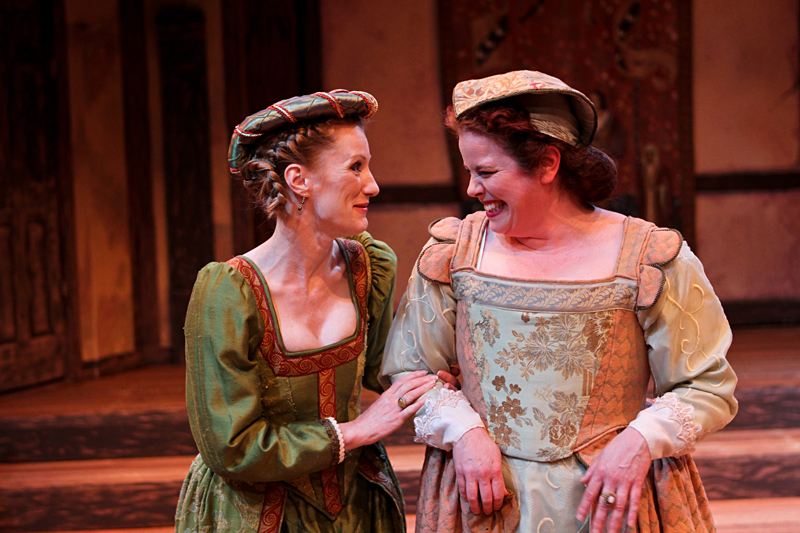Seattle Shakespeare Company is in transition, with artistic director Stephanie Shine and managing director John Bradshaw leaving and gone, respectively. Stepping in to direct Wives is Terry Edward Moore, who co-founded the company in 1991 and has been away since ’96. He resists the temptation to update the comedy in a Real Housewives context, instead celebrating its distinction as Shakespeare’s only play set in the time and place of its writing (1590s England). John Falstaff, that dissolute yet lovable pal of Prince Hal in Henry IV, becomes a franchise when Shakespeare plops him down, two centuries after the Battle of Agincourt, in the provincial hamlet of Windsor.
Still quaffing sack and pinching wenches, Falstaff (John Patrick Lowrie) here sets his mercenary sights on two married society women, Mrs. Ford and Mrs. Page (the charmingly dissimilar Candace Vance and Leslie Law, respectively), who soon discover his duplicate wooing. They then conspire to trick him into a series of humiliations that, in our age of reality TV, seem rather tame. Meanwhile, some ludicrous contenders vie for the hand of Mrs. Page’s daughter Anne (demure Katherine Jett), and Mr. Ford (Anders Bolang) tests his wife’s affections by paying Falstaff to sully her. (Some gigolo: Falstaff wields his peninsular belly like a Siamese-twin companion.) Festooned by Deane Middleton in canary colors, the wives scheme, dissemble, lock pinkies, and nearly extinguish themselves with laughter at their own clever trickery. By the standards of their society, these girls have definitely gone wild.
However, despite a capable cast that ekes many a titter out of the script, Merry Wives‘ notion of wildness remains fixed in the 16th century. All the Elizabethan antics, pungent insults, and running jokes might’ve been usefully condensed. As it is, the players earnestly plow through Shakespeare’s gags and physical comedy, but little of it scores any big laughs or emotion. It’s a bit of a drag to sit through. The major exception is Moore’s one liberty with the play (most recently staged by SSC in 2001): In addition to playing the gloating, scheming, malapropism-spouting Mistress Quickly, Therese Diekhans appears as a magical, unbilled character that the Bard never wrote (but perhaps met). Not in the original folio, sure, but the audience loved it.
After all the conniving and contriving in town (under the watchful eye of set designer Jason Phillips’ cuckoo clock), it’s a relief when Wives finally repairs to the forest in an exorcism-like frenzy of masks and otherworldly oboe enchantment. At last, superficial hypocrisies are jettisoned and ids come out to play in lighting designer Kent Cubbage’s dappled moonlight. Real love is the coin of this lush realm, and several characters find it there. Falstaff, unsurprisingly, is not one of them.








